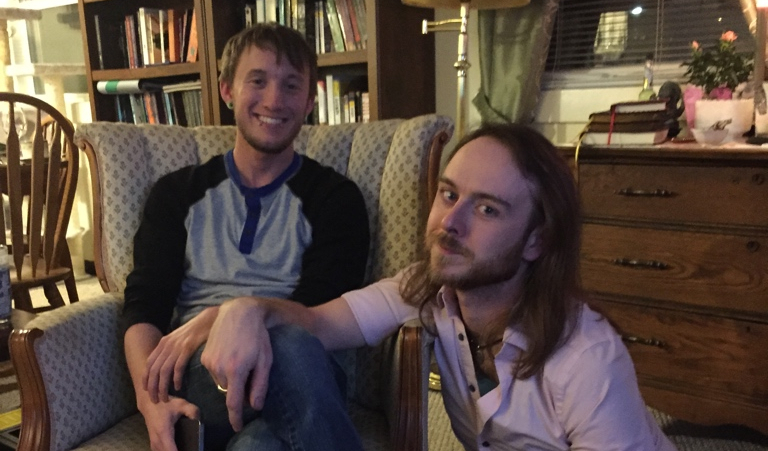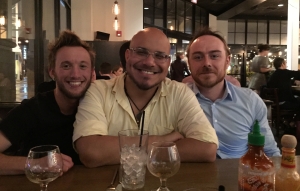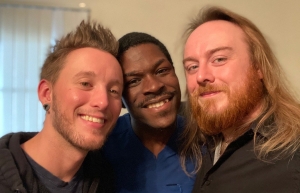I had every intention of posting this in time for Beltane, on May 1st, but the semester was rapidly coming to a close, and life just sort of got in the way. One would think that with a nearly unlimited supply of time, one would also have a nearly unlimited supply of energy, but alas. Nevertheless, as Beltane is often treated like a sexier Valentine’s Day in the pagan community, ’tis the season to talk about relationships.
In an earlier post, I talked about the fact that my husband and I practice consensual non-monogamy. As I think back on the early days of our relationship, it was never necessarily our intention to be polyamorous. Then again, it was never necessarily our intention to be in a relationship at all. Ironically, I think both of these things laid a much stronger foundation for how we operate as a couple.
Let me explain what I mean.
starting out as friends
American society has long revolved around the idea of finding a lifelong partner at an early age. (I certainly won’t say that this is limited to the United States, but they say you should write what you know.) Growing up in the eighties and nineties, I was raised with a fairly steady diet of the idea that you meet someone, settle down with them, and live happily ever after. I think it’s safe to say I’m far from the only one in my generation to have followed that pattern and discovered things don’t always work that way. Side note—I was born in December of 1982, and graduated high school in 2000, so whether I am technically Generation X or a Millennial is ultimately a matter of interpretation.
My original fairy tale didn’t work out, either. When we started dating, I was 20, he 25. We bought a house, got married, had a lot of instability in the relationship, and we separated shortly after I turned 29. My ex-husband is a good man, and I’d like to think I am, too. Our particular goodnesses were not good for each other, however, and now eight years out from our separation and later divorce, we are each with partners that suit our temperaments better, and we even have friendly contact with one another. Sometimes, people are just better off as friends.
But, how does this happen? When we meet a prospective partner, we operate under this assumption that we need to put our “best foot forward” and hide all of our idiosyncracies and issues. We pretend to be perfectly “normal,” whatever that means to us individually, and then, once we feel safe being ourselves, as Iliza Schlesinger puts it in her Elder Millennial special, we decide “this looks like a nice place for me to unpack my crap!” Our poor partner has no idea what’s coming. The irony being that, most often, they do the same thing and we are equally taken aback.
Perhaps part of the shock comes from this ideal we have that finding a partner means that we will finally be “complete.” This person, whomever they may be, is our “other half,” the missing piece of some ideal whole, and once we find the right one, everything will be perfect. I am not the first to say this, I will not be the last, and I am under no delusion that I am the only one, but—it does not work like that. And when we discover that our partner and prospective savior is just as fallible and fucked up as we are, the magic starts to fade. They aren’t perfect any longer, and our inclination is to run now that we know the dreaded truth. Now, it bears mentioning that I am not saying that we aren’t allowed to have our deal-breaker issues, or that finding out your partner is secretly manipulative and subtly controlling and abusive isn’t grounds to run far and fast. What I am saying is that dropping someone at the first sign that they can’t actually reach that pedestal we’ve built for them sets us up for a lifetime of disappointment.

- Aiden & I, Spring Equinox 2015
In our case, we met with the understanding that we were looking for friendship. Our getting-to-know-you stage was unencumbered by the pressure of putting our best foot forward, because we were not consciously auditioning for the part of future spouse. Instead, we were relatively free to discuss the good, the bad, and the ugly of our pasts, and developed a level of comfort with one another that only comes with knowing someone has heard the dark parts of your story and isn’t running off.
- That we turned out to be romantically compatible was a revelation that came after we had already seen the skeletons in each other’s closets. It was not the result thereof—I have other friends who know my entire life story with whom I could never be romantically involved—but a delightful coincidence. Because we had already connected with one another as friends, when our relationship took an amorous turn it was built on a solid foundation of the truth, rather than being an illusory oasis in the desert. In addition, it was built on honest-to-goodness mutual affection, rather than on he’s-cute-I-hope-he’s-as-awesome-as-I-think-he-is idealism. We knew what we were getting into with each other, and what we were getting from each other, well before there was any talk of permanence.
non-exclusivity
In these days of casual sex and hookup culture, the question is often asked what the long-term effects or social implications of these behaviors are. According to one researcher, it has a lot more to do with your individual attitude toward the concept than anything else. Which makes sense, being that, at the end of the day, sex is a biological function, and what you think about it has a lot more to do with your cultural framework than it does biology. Attraction, similarly, is an entirely natural biological process. No matter who we are, we know the sort of person we are attracted to, or not. We also know that this doesn’t stop just because we have developed a romantic attachment to a particular person.
(I’ll allow you a moment for your mental record-scratch.)
The vast majority of us have crushes. Whether it’s a celebrity, the beautiful woman at the office, or that beardy barista with the nice butt, they happen. What’s more, almost every single one of us has experienced a crush, or at minimum a sense of attraction, even when in a committed relationship, and even when we are euphorically happy with our partner. Many times this recognition is accompanied by tacit denial, because it approaches the line of infidelity as we tend to define it culturally. And I say culturally, because as my Cultural Anthropology textbook from this semester says, there are many ways that humanity defines family and relationships, and they are not constant from one society to the next. The ideal of strict monogamy is not unique to Western culture, but it is not universal.
Even within the context of American society, where we place a heavy emphasis on sexual fidelity to one person, we see that adherence to the ideal is less than consistent. In relationships where one is expected to never engage sexually with anyone other than their partner, we are obsessed with the idea of cheating. Abundant examples exist of the trope of the jealous girlfriend angry because her boyfriend looked at another woman, and a casual scroll through any social media site will present a cornucopia of men, insecure about how their partner presents online, especially if they have a strong social media following. And, realistically, these conversations and complaints happen because people are afraid of their partner straying—with good reason, given how often we hear about someone having a “side chick,” or that someone is divorcing a cheating wife.
Taking all this into account, one might wonder why a couple would deliberately choose not to be monogamous. For starters, I think there is a degree of pragmatism involved. If I know that attraction is a natural function, and I experience it no matter my relationship status, then to me it seems hypocritical at best to expect my partner never to look at another person. Additionally, Aiden and I have an eerily-in-tune idea of the sorts of people we’re attracted to—neither of us could tell you what constitutes our “type” but we always agree—and we both tend to think it’s more fun to check people out together. This alone has always been my “price of admission” for a relationship, in that I don’t set an unrealistic expectation on my partner and I will not accept it for myself.
Looking, touching, and loving are, of course, not the same thing. However, somewhere in the myriad conversations we had about our relationship we never really discussed the idea of exclusivity. For a number of reasons that would take three more posts to explain, there was a long span of time between realizing we had feelings for one another and even calling ourselves officially in a relationship, and during that time we did not establish an expectation of monogamy. That’s not to say that either of us was running wild through the streets, but there was still the odd date with someone else here or there, and though there were some arguments about what was or wasn’t a boundary, we settled into a routine where, as long as there was honest communication, there was trust.
The reality is, we are both adults. I don’t own my husband, and he doesn’t own me, and I trust his judgement. Precisely because of the way we met, and our beliefs on what it means to be in a relationship, we approach the idea of relationships with other people in much the way that most folks think of friendships. You typically have more than one friend, your friends know each other exist, and while jealousy occasionally rears its head, friends don’t demand that your friendship be reserved solely for them. Similarly, we do not subscribe to the idea that romantic love is a limited commodity, and having feelings for more than one person does not diminish them for anyone involved. Our marriage vows were based around this idea of mutual respect and personal agency:
You cannot possess me, for I belong to myself,
But while we both wish it, I give you that which is mine to give.
You cannot command me, for I am a free person,
But I shall serve you in those ways you require.
I pledge to you that yours will be the lips I kiss at night,
And the eyes into which I smile in the morning.
I pledge to you the first bite from my meat,
And the first drink from my cup.
I pledge to you my living and dying, equally in your care,
And to tell no strangers our grievances.
This is my wedding vow to you.
This is a marriage of equals.
I married Aiden, not because I needed him to fulfill a specific “role” in our relationship, but because he inspires me to be the best version of myself I can be. The fact that our marriage is neither romantically nor sexually exclusive doesn’t take away from that. It allows us each the freedom to fulfill our needs in ways the other can’t provide. There are things I cannot expect of myself, that Aiden may be able to find in another partner; I would rather he find those things in someone else and still come home to me, than that he face a choice of being miserable, or leaving me, only to find that someone else doesn’t provide him with things that I do.

Being non-exclusive is not without its challenges, but these mostly have to do with time. At present, Aiden’s boyfriend, Michael, lives in Dallas, Texas, which means their relationship is conducted almost entirely in text messages and the occasional FaceTime date. Malcolm is in Chicago, which makes him more accessible, but it still means we don’t see him as often as we would like.

- Aiden, Malcolm & I
Time becomes an essential resource, and while COVID has given us more of it, since the restaurant is closed and neither of us is presently working, it doesn’t mean our other partners are off, and we are all stressed and a little traumatized. Still, one I’m sure has the question of why we have other partners at all, and I think it comes back to the same reason we are together in the first place. We made a connection. As simple as that.
Aiden and Michael worked together, became occasional drinking buddies, and then started hanging out more regularly. At no point was I unaware that they were becoming close, and when Aiden told me that they had developed feelings for one another, I was neither surprised nor dismayed—on the contrary, I was elated, an experience called “compersion” in the non-monogamy community. While Michael and I are not romantically involved, he is a very good and trusted friend, and even acted as the ring bearer in our wedding ceremony.
I matched randomly with Malcolm via an online dating app during a trip to Chicago. We texted off and on (mostly on) for a few months, and then I introduced him (virtually) to Aiden. The three of us blend incredibly well together, and when he came down to visit for the C-U Pridefest it sealed the deal. He’s a charming goofball—even if he doesn’t eat mushrooms—and he brightens my day. We also work well when it comes to supporting each other on the not-so-good days, just as one would hope any good partner will do.
Someone asked me, “if that’s the way you feel, why even get married?” From their perspective, our relationship just includes a free pass to cheat. The trick is, cheating involves breaking rules and being dishonest. No one is lying about anything here and having these additional connections does not detract from our marriage. Instead, what we have is a cluster of trusted emotional supporters, and while the individual nature of our relationships varies, it means we have more than just each other. That also means that at times when both of us are going through something challenging, we have more loving embraces to bolster our spirits.
Certainly, friends are sometimes just as valuable in this regard, but there is something about having a relationship partner who supports you that does more good for the heart. If that weren’t the case, we wouldn’t need partners in the first place. While I won’t say that having more than one partner works for everyone, for us it has greatly contributed to our emotional health, and enabled us to be better husbands for each other, as well as better boyfriends to our other partners. As reasons go, that’s good enough for me.

